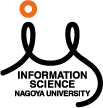Comprehensive List of Researchers "Information Knowledge"
Department of Media Science
- Name
- MIWA, Kazuhisa
- Group
- Cognitive Informatics Group
- Title
- Professor
- Degree
- Dr. of Engineering
- Research Field
- Cognitive modeling / Cognitive psychology / Intelligent tutoring systems

Current Research
Cognitive Science of Creativity and Discovery
OUTLINEWe are studying cognitive science, especially human higher-order cognition such as scientific discovery, or more generally creative thinking processes. The list of research topics that we have pursued over the past ten years includes creativity, scientific discovery, collaboration, insight, external resources in thinking, analogy, and search. In our lab, we have tackled these topics based on a combination of two research approaches: (1) the model-based approach of creating models of the human mind and (2) the psychological-experiment approach of investigating the human mind experimentally in a psychology setting. Additionally, we have developed tutoring systems and science programs for bridging our understanding of the human mind and its application to learning science and information system science.
(1) Creativity
We have investigated the cognitive processes underlying creative thinking. Creativity research is one of the most important topics in the cognitive science of higher-order cognition. We have conducted laboratory studies, and based on our findings we have developed computer systems that support human creative thinking and science programs where students learn creative thinking.
(2) Scientific discovery
The scientific discovery process involves hypothesis-formation and hypothesis-verification stages. We understand the process of scientific discovery as the interplay of these two stages. We have adopted various approaches to expand our research such as the model-based approach, the psychological-experiment approach, and application of trials to science education.
(3) Collaboration
Human-Human interaction emerges in various situations, from classrooms through virtual environments such as the Internet. Interaction has become a hot topic in recent cognitive science. We have explored emergence phenomena where a new higher function emerges from lower-level interactions. Recently, we have begun to investigate not only human-human interaction but also human-computer agent interaction.
(4) Insight
Even when solving simple problems, we sometimes run into an impasse because past experiences arouse biases. In such situations, we often experience a flash of illumination at the moment of finding the solution. This type of problem solving is called insight problem solving. Insight strongly relates to human creative thinking. We have investigated the insight process based on a combination of laboratory experiments and computer models constructed to explain the nature of insight.
(5) Analogy
Analogy is inference for solving novel problems that people face based on knowledge in well-known domains. Analogy has been thoroughly studied in the field of higher-order cognition. Analogy also plays a central role in creative thinking and scientific discovery. Based on the enormous legacy of past studies, we have studied analogical inference in the context of everyday life and have developed a tutoring system that adopts analogical fnference in information processing.
Career
- Kazuhisa Miwa received the Dr. of Engineering degree in information Engineering from Nagoya University in 1989.
- He was a visiting assistant professor at Carnegie Mellon University from 1991 to 1992. Since 2004, he has been a professor in the Graduate School of Information Science, Nagoya University.
Academic Societies
- Cognitive Science Society
- Japanese Cognitive Science Society
- Japanese Artificial Intelligence Society
- IEICE
- Japanese Society for Information and Systems in Education
Publications
- Miwa, K., Morita, J., Nakaike, R., & Terai, H. in press. Learning through Intermediate Problems in Creating Cognitive Models. Interactive Learning Environments.
- Miwa, K., & Terai, H. (2012). Impact of Two Types of Partner, Perceived or Actual, in Human-Human and Human-Agent Interaction. Computers in Human Behavior, 28, 1286−1297.
- Miwa, K. (2004). Collaborative discovery in a simple reasoning task. Cognitive Systems Research, 5, 41- 62.








